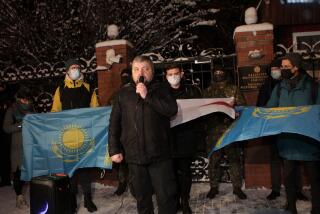Polish Authorities Seize Most-Wanted Solidarity Fugitive
- Share via
WARSAW — Government authorities Saturday announced the capture of Zbigniew Bujak, the most prominent fugitive member of the Solidarity underground and Poland’s most-wanted political activist.
The arrest of the 31-year-old Bujak, a charismatic former army commando who had eluded police since the martial-law crackdown in December, 1981, marked the end of a major chapter in the outlawed union’s clandestine struggle for existence.
In a brief announcement, the official news agency PAP quoted Poland’s Interior Ministry as saying that Bujak had been arrested under a warrant issued by the military prosecutor. It said he is accused of “activities aimed at overthrowing the constitutional system of people’s Poland.” This wording indicated that Bujak, like other members of the underground arrested in recent months, will be formally charged with treason.
There was no indication when or where he was seized, but in similar cases the authorities have released the news only a day or more after arresting a member of the underground, apparently in the hope of trapping collaborators.
Solidarity founder Lech Walesa issued a statement Saturday night praising Bujak as “one of the most outstanding and bravest fighters for citizens’ rights and Solidarity.”
“Dear Zbiszek,” Walesa said, using a nickname for Bujak, “I thank you for what you have done on your own behalf and on behalf of all friends.”
A former electrician at the Ursus tractor works in Warsaw, one of the focal point of Solidarity’s strength, Bujak served as the elected chairman of the independent union’s Warsaw chapter until it was suppressed under martial law on Dec. 13, 1981.
Reportedly captured several days later, Bujak is said to have escaped by jumping from a moving police car. In early 1982, he became one of five founding members of Solidarity’s underground coordinating committee, known by its Polish initials as TKK.
The TKK has maintained nationwide communications among clandestine factory units of Solidarity, where several hundred thousand of the union’s original 10 million members reportedly still pay dues to support a wide range of activities--from the still-vigorous underground press to support for the families of political prisoners.
As he continued to elude the police, Bujak became a national symbol of defiance to the Communist authorities, taunting them in public calls for strikes and demonstrations and occasionally granting interviews to Western journalists in widely scattered safehouses run by the underground.
Resistance Without Force
As time passed, however, Bujak also came to symbolize the underground’s growing weariness and impotence. TKK’s militant calls for protests against food price increases and the plight of political prisoners drew a progressively smaller response over the last two years, as most workers came to view direct confrontation with the authorities as futile and lapsed into moods of sour resignation and apathy.
“Perhaps we are not as brave as people think,” Bujak said in a statement circulated in July, 1984, that took Solidarity supporters to task for showing a lack of resolve.
The survival of the union and its democratic ideals, he said, “depends only on the will and determination of those who desire to have it.”
His arrest is a heavy, but not fatal blow for the underground, which has been greatly diminished in the last two years by arrests and resignations under the government’s periodic amnesties. Currently, only two lesser-known figures remain publicly identified with TKK and are thus able to give a stamp of authenticity to its statements.
Away From Political Centers
They are Jan Andrzej Gorny of Katowice and Marek Muszynski of Wroclaw, both in southern Poland. As such, these leaders are far from the twin centers of unofficial Polish political life--Warsaw and Gdansk, the latter the Baltic seaport where Solidarity began in the strikes of August, 1980.
A profusion of underground printing organizations remain, however, producing more than 200 regular news bulletins around the country as well as books and clandestine audio and video tapes.
More to Read
Sign up for Essential California
The most important California stories and recommendations in your inbox every morning.
You may occasionally receive promotional content from the Los Angeles Times.












